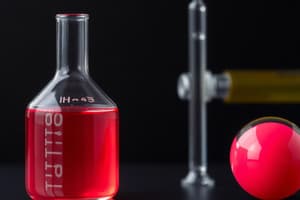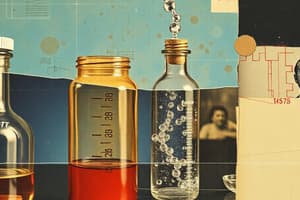Podcast
Questions and Answers
How does the concentration of reactants affect the rate of a chemical reaction?
How does the concentration of reactants affect the rate of a chemical reaction?
- It only affects reactions in gaseous states.
- It has no effect on the reaction rate.
- A higher concentration decreases the likelihood of collisions.
- A higher concentration increases the likelihood of collisions. (correct)
Which factor can significantly alter the rate of a chemical reaction?
Which factor can significantly alter the rate of a chemical reaction?
- The presence of an external magnetic field.
- The color of the reactants.
- The viscosity of the solution.
- The state of the reactants. (correct)
Why does increasing the surface area of reactants enhance the reaction rate?
Why does increasing the surface area of reactants enhance the reaction rate?
- It decreases the number of particles available for reaction.
- It allows for more effective collisions between reactants. (correct)
- It introduces a catalyst to the reaction.
- It lowers the temperature of the reactants.
What effect does temperature have on the rate of a chemical reaction?
What effect does temperature have on the rate of a chemical reaction?
What role does a catalyst play in a chemical reaction?
What role does a catalyst play in a chemical reaction?
Flashcards
Concentration of Reactants
Concentration of Reactants
The higher the concentration of reactants, the more likely they are to collide and react, speeding up the reaction.
Nature and State of Reactants
Nature and State of Reactants
The chemical nature of reactants, like their size and structure, influences how easily they react. Their physical state (solid, liquid, gas) also impacts reaction speed.
Surface Area
Surface Area
The larger the surface area of reactants, the more contact points there are for collisions, speeding up the reaction.
Temperature
Temperature
Signup and view all the flashcards
Catalyst
Catalyst
Signup and view all the flashcards
Study Notes
Factors Affecting Reaction Rate
-
Reactant Concentration: Higher reactant concentrations lead to more frequent particle collisions, accelerating the reaction.
-
Reactant Nature and State: The chemical properties and physical states (solid, liquid, gas) of reactants influence the reaction rate. Molecular structure also plays a role.
-
Surface Area: A larger surface area between reactants facilitates more collisions and increases the reaction rate.
-
Temperature: Higher temperatures provide more energy to particles, increasing their movement and collision frequency, thus speeding up the reaction.
-
Catalyst Presence: Catalysts increase reaction rates by lowering the activation energy needed for a reaction to occur, without being consumed in the process.
Studying That Suits You
Use AI to generate personalized quizzes and flashcards to suit your learning preferences.




